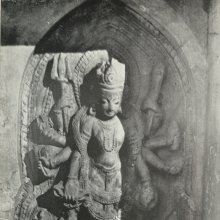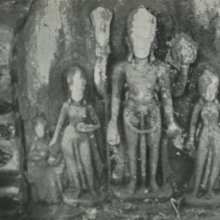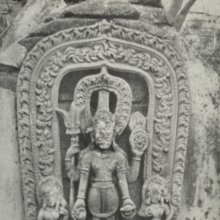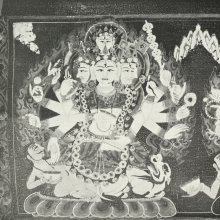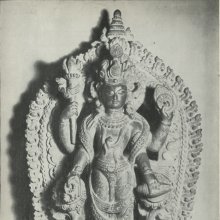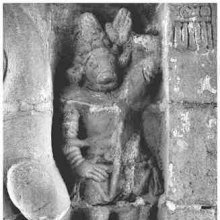Harihara, Hari-hara: 10 definitions
Introduction:
Harihara means something in Buddhism, Pali, Hinduism, Sanskrit. If you want to know the exact meaning, history, etymology or English translation of this term then check out the descriptions on this page. Add your comment or reference to a book if you want to contribute to this summary article.
Images (photo gallery)
(+11 more images available)
In Hinduism
Shilpashastra (iconography)
Source: Archaeological Survey of India: Śaiva monuments at Paṭṭadakal (śilpa)Harihara (हरिहर) is found as a sculpture on the exterior (southern wall) of the temple of Trailokyeśvara.—In the next niche is a composite image of Śiva and Viṣṇu as Śaṅkara-Nārāyaṇa but popularly known as Harihara. Their mounts are by their side viz. Garuḍa on Hari’s and Nandin on Śiva’s. The hand position of both gods in these niches is identical. But with regard to the feet Candraśkhara (in the previous niche) is in cāripāda, set to walk pose,whereas Śaṇkara-Nārayaṇa is in samapāda.

Shilpashastra (शिल्पशास्त्र, śilpaśāstra) represents the ancient Indian science (shastra) of creative arts (shilpa) such as sculpture, iconography and painting. Closely related to Vastushastra (architecture), they often share the same literature.
Purana and Itihasa (epic history)
Source: Shodhganga: The saurapurana - a critical studyHarihara (हरिहर) represents a “syncretic form of Śiva and Viṣṇu”, according to the 10th century Saurapurāṇa: one of the various Upapurāṇas depicting Śaivism.—This [Harihara] form of Śiva represents a mixture of Śiva traits and those of Viṣṇu. The left side was that of Hari (Viṣṇu), the right being that of Hara (Śiva). It was a sort of coaliton of two sects which had so long vied with each other for supremacy. Thus the Mahābhārata contemplated Viṣṇu in the form of Śiva and Śiva in the form of Viṣṇu.
In the chapter 24 of the Saurapurāṇa Śiva expresses before Brahmā that Viṣṇu is a portion of Him. He also affirms Viṣṇu that there is no difference between Śiva and Viṣṇu. Viṣṇu is the Śakti of Śiva. Everything is pervaded with Śiva and Viṣṇu. Śiva is the knower (jñata) and Viṣṇu is the knowledge ([jñāna?]), Hara is the comprehender (mantā) and Hari is the mind (mati). Hari is Prakṛti and Hara is Puruṣa. This syncretic view is recorded in chapter 29 of the Saurapurāṇa in the context of killing of the demon Andhaka.

The Purana (पुराण, purāṇas) refers to Sanskrit literature preserving ancient India’s vast cultural history, including historical legends, religious ceremonies, various arts and sciences. The eighteen mahapuranas total over 400,000 shlokas (metrical couplets) and date to at least several centuries BCE.
In Buddhism
Tibetan Buddhism (Vajrayana or tantric Buddhism)
Source: archive.org: The Indian Buddhist IconographyHarihara (हरिहर) or Hariharalokeśvara refers to number 84 of the 108 forms of Avalokiteśvara found in the Machhandar Vahal (Kathmanu, Nepal). [Machhandar or Machandar is another name for for Matsyendra.].
Accordingly,—
“Harihara is identical with [Piṇḍapātra Lokeśvara] except that here he displays the Vyākhyāna mudrā with his two hands against the chest.—Piṇḍapātra Lokeśvara is one-faced and two-armed and stands on a lotus. He holds the Piṇḍapātra (the bowl) in his two hands near the navel”.
The names of the 108 deities [viz., Harihara] possbily originate from a Tantra included in the Kagyur which is named “the 108 names of Avalokiteshvara”, however it is not yet certain that this is the source for the Nepali descriptions. Tibetan Buddhism includes schools such as Nyingma, Kadampa, Kagyu and Gelug. Their primary canon of literature is divided in two broad categories: The Kangyur, which consists of Buddha’s words, and the Tengyur, which includes commentaries from various sources. Esotericism and tantra techniques (vajrayāna) are collected indepently.
Languages of India and abroad
Sanskrit dictionary
Source: DDSA: The practical Sanskrit-English dictionaryHarihara (हरिहर).—a particular form of deity consisting of Viṣṇu and Śiva conjoined; see हरेश्वरः (hareśvaraḥ). °आत्मकः (ātmakaḥ)
1) Name of Garuḍa.
2) of Śiva's bull.
Derivable forms: hariharaḥ (हरिहरः).
Harihara is a Sanskrit compound consisting of the terms hari and hara (हर).
Source: Cologne Digital Sanskrit Dictionaries: Shabda-Sagara Sanskrit-English DictionaryHarihara (हरिहर).—m.
(-raḥ) A particular form of deity consisting of Vishnu and Siva conjointly.
Source: Cologne Digital Sanskrit Dictionaries: Cappeller Sanskrit-English DictionaryHarihara (हरिहर).—[masculine] a deity consisting of Viṣṇu and Śiva conjoined; [dual] Viṣṇu and Śiva.
Source: Cologne Digital Sanskrit Dictionaries: Aufrecht Catalogus Catalogorum1) Harihara (हरिहर) as mentioned in Aufrecht’s Catalogus Catalogorum:—patron of Īrugapadaṇḍanātha (Nānārtharatnamālā). Oxf. 193^b.
2) Harihara (हरिहर):—patron of Cinnabhaṭṭa (Tarkabhāṣāprakāśikā). Oxf. 244^a.
3) Harihara (हरिहर):—king of Vidyānagara (1379-1401), son of Bukka I, patron of Sāyaṇa. Oxf. 223^a.
4) Harihara (हरिहर):—son (or perhaps only descendant) of Sūrya, patron of Lolimbarāja (Harivilāsa).
5) Harihara (हरिहर):—father of Ravikara (Piṅgalasāravikāśinī). Oxf. 197^a.
6) Harihara (हरिहर):—poet. Padyāvalī.
7) Harihara (हरिहर):—on [dharma] Quoted by Vācaspatimiśra in Dvaitanirṇaya Oxf. 273^b, by Kamalākara in Nirṇayasindhu.
8) Harihara (हरिहर):—Āśaucadaśaka. Daśaślokīvivaraṇa.
9) Harihara (हरिहर):—Kraturatnamālā Vs.
10) Harihara (हरिहर):—Citrabhānukāvya.
11) Harihara (हरिहर):—Chandogapariśiṣṭaprakāśaṭīkā.
12) Harihara (हरिहर):—Jānakīmāṇikyastava.
13) Harihara (हरिहर):—Devīkavaca.
14) Harihara (हरिहर):—Pātraśuddhi [tantric] Vidyāsādhana [tantric]
15) Harihara (हरिहर):—a Maithila, brother of Nīlakaṇṭha: Prabhāvatīpariṇaya nāṭaka.
16) Harihara (हरिहर):—Prayogaratna.
17) Harihara (हरिहर):—Yogaśikṣā, yoga.
18) Harihara (हरिहर):—Ratirahasya.
19) Harihara (हरिहर):—Rasamaṇi med. Rasādhikāra.
20) Harihara (हरिहर):—Vairāgyapradīpa.
21) Harihara (हरिहर):—Śivopaniṣad.
22) Harihara (हरिहर):—Śṛṅgārabhedapradīpa alaṃk.
23) Harihara (हरिहर):—Siddhāntaśiromaṇiṭīkā.
24) Harihara (हरिहर):—Subhāṣita.
25) Harihara (हरिहर):—son of Nṛsiṃha: Anargharāghavaṭīkā. Tārkikarakṣāsaṃgrahaṭīkā.
26) Harihara (हरिहर):—son of Bhaṭṭa Bhāskara: Antyeṣṭipaddhati.
27) Harihara (हरिहर):—wrote only a
—[commentary] on the Āśaucadaśaka. This is of course identical with the Daśaślokīvivaraṇa.
28) Harihara (हरिहर):—son of Āśādhara: Gaṇitacūḍāmaṇi or Vāsanāsārasarvasva.
29) Harihara (हरिहर):—son of Nārāyaṇa: Ācārasaṃgraha.
30) Harihara (हरिहर):—Bhaṭṭikāvyaṭīkā.
Source: Cologne Digital Sanskrit Dictionaries: Monier-Williams Sanskrit-English Dictionary1) Harihara (हरिहर):—[=hari-hara] [from hari] m. ‘Viṣṇu-Śiva’, a [particular] form of deity consisting of V° and Ś° conjoined, [Kāvya literature; Religious Thought and Life in India 65]
2) [v.s. ...] ([dual number] or in [compound]) Viṣṇu and Śiva, [Harivaṃśa; Hitopadeśa]
3) [v.s. ...] Name of various persons, [Tattvasamāsa; Kṣitīśa-vaṃśāvalī-carita] etc.
4) [v.s. ...] of a river, [Prāyaścitta-tattva]
[Sanskrit to German]
Sanskrit, also spelled संस्कृतम् (saṃskṛtam), is an ancient language of India commonly seen as the grandmother of the Indo-European language family (even English!). Closely allied with Prakrit and Pali, Sanskrit is more exhaustive in both grammar and terms and has the most extensive collection of literature in the world, greatly surpassing its sister-languages Greek and Latin.
Kannada-English dictionary
Source: Alar: Kannada-English corpusHarihara (ಹರಿಹರ):—
1) [noun] the combination of the aspects of both Viṣṇu and Śiva.
2) [noun] a deity or idol representing this combination.
Kannada is a Dravidian language (as opposed to the Indo-European language family) mainly spoken in the southwestern region of India.
See also (Relevant definitions)
Starts with (+32): Harihara agnihotrin, Harihara arya, Harihara bhatta, Harihara bhattacarya, Harihara pandita, Harihara sarasvati, Harihara tarkalamkara bhattacarya, Harihara upadhyaya, Hariharabhashya, Hariharabhatta, Hariharabhattacarya, Hariharabhedadhikkara, Hariharabrahmamanasikasnanavidhi, Hariharabrahman, Hariharacaturanga, Hariharadeva, Hariharadeva hindupati, Hariharadevahindupati, Hariharadikshita, Hariharadikshitiya.
Ends with: Heddeshaharihara, Shriharihara.
Full-text (+137): Hridayaduta, Hariharaprashamsa, Hariharayoga, Hariharadikshitiya, Hariharavilasa, Hariharapaddhati, Hariharabhashya, Hariharastotra, Hariharabrahman, Hariharabhatta, Hariharabhedadhikkara, Hariharasvamin, Hariharabhattacarya, Hariharataratamya, Hariharabrahmamanasikasnanavidhi, Hariharamishra, Hariharapuri, Hariharakhana, Hariharapandita, Hariharasarasvati.
Relevant text
Search found 46 books and stories containing Harihara, Hari-hara; (plurals include: Hariharas, haras). You can also click to the full overview containing English textual excerpts. Below are direct links for the most relevant articles:
Shat-cakra-nirupana (the six bodily centres) (by Arthur Avalon)
The Philosophy and Personality of Tikkana < [March 1945]
The Encounter < [October – December, 1978]
Reviews < [November-December 1934]
Sahitya-kaumudi by Baladeva Vidyabhushana (by Gaurapada Dāsa)
Text 10.121 < [Chapter 10 - Ornaments of Meaning]
Text 9.2 < [Chapter 9 - Ornaments of Sound]
The Indian Buddhist Iconography (by Benoytosh Bhattachacharyya)
The Devi Bhagavata Purana (by Swami Vijñanananda)
Chapter 19 - On the prayer and hymns to the Devī < [Book 5]
Chapter 5 - On the chanting of hymns by Hara and Brahmā < [Book 3]
Chapter 7 - On the praise of the Devī < [Book 1]
Chaitanya Bhagavata (by Bhumipati Dāsa)
Verse 3.9.360 < [Chapter 9 - The Glories of Advaita]
Verse 1.1.42 < [Chapter 1 - Summary of Lord Gaura’s Pastimes]
Verse 3.2.308 < [Chapter 2 - Description of the Lord’s Travel Through Bhuvaneśvara and Other Placesto Jagannātha Purī]
Related products
